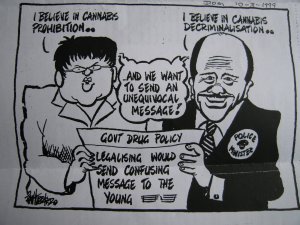
Harvard Lecturer: Legalize Drugs to End Border Violence
(Published 03/24/2009 by Talkleft)
Another voice in the small but growing crowd urging legalization of drugs to end the Mexico drug war violence: Harvard Senior Lecturer in Economics Jeffrey Miron.
Argument 1: Prohibition creates violence. It happened with alcohol and gambling. End the prohibition, end the violence. [More…]
Prohibition creates violence because it drives the drug market underground. This means buyers and sellers cannot resolve their disputes with lawsuits, arbitration or advertising, so they resort to violence instead.
Violence was common in the alcohol industry when it was banned during Prohibition, but not before or after. Violence is the norm in illicit gambling markets but not in legal ones. Violence is routine when prostitution is banned but not when it’s permitted. Violence results from policies that create black markets, not from the characteristics of the good or activity in question. The only way to reduce violence, therefore, is to legalize drugs (emphasis supplied.)
But, there are other reasons, according to Miron: Such as, legalize drugs, reduce bribery.
Prohibition of drugs corrupts politicians and law enforcement by putting police, prosecutors, judges and politicians in the position to threaten the profits of an illicit trade.
Criminalization of drugs erodes our constitutional rights:
Prohibition erodes protections against unreasonable search and seizure because neither party to a drug transaction has an incentive to report the activity to the police. Thus, enforcement requires intrusive tactics such as warrantless searches or undercover buys. The victimless nature of this so-called crime also encourages police to engage in racial profiling.
Prohibition is bad for national security:
Prohibition has disastrous implications for national security. By eradicating coca plants in Colombia or poppy fields in Afghanistan, prohibition breeds resentment of the United States. By enriching those who produce and supply drugs, prohibition supports terrorists who sell protection services to drug traffickers.
Prohibition harms the public health:
Patients suffering from cancer, glaucoma and other conditions cannot use marijuana under the laws of most states or the federal government despite abundant evidence of its efficacy. Terminally ill patients cannot always get adequate pain medication because doctors may fear prosecution by the Drug Enforcement Administration.
Prohibition breeds disrespect for the rule of law:
Prohibitions breed disrespect for the law because despite draconian penalties and extensive enforcement, huge numbers of people still violate prohibition. This means those who break the law, and those who do not, learn that obeying laws is for suckers.
And the number one reason that may resonate with the public in these perilous economic times: Prohibition is a financial drain.
Federal, state and local governments spend roughly $44 billion per year to enforce drug prohibition. These same governments forego roughly $33 billion per year in tax revenue they could collect from legalized drugs, assuming these were taxed at rates similar to those on alcohol and tobacco. Under prohibition, these revenues accrue to traffickers as increased profits.
President Obama‘s new plan to spend $700 million for border security is the wrong approach. And that’s in addition to Merida:
The funds, meant to assist what administration officials described as an “anti-smuggling effort,” will complement ongoing U.S. aid to Mexico under the Merida initiative, a three-year $1.4 billion package aimed at helping Mexico fight the drug cartels with law enforcement training, military equipment and improved intelligence cooperation.
The war on drugs is a failure. Plan Mexico will crash and burn.
Related articles by Zemanta
- Drug Prohibition: illiberal, murderous and pointless. [the Economist] (mildgreens.blogspot.com)
- A Latin American Perspective on the Drug Wars As Obama Names A Drug Czar (mydd.com)
- Official: Mexican drug turf wars have led to surge in violence (cnn.com)
- NZ On Drugs, Human Rights and Harm Reduction (mildgreens.blogspot.com)




![Reblog this post [with Zemanta]](https://i0.wp.com/img.zemanta.com/reblog_e.png)
